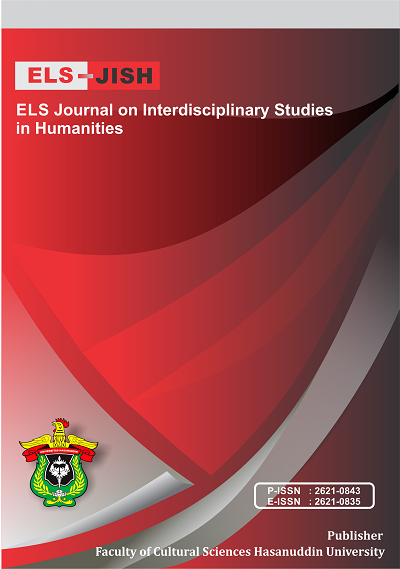An Ambition to Redeem His Guilts of Amir in Khalid Hosseini’s “The Kite Runner”
DOI:
https://doi.org/10.34050/elsjish.v7i1.32794Keywords:
Ambition, The Kite Runner, RedeemAbstract
This study not only investigates the concept of ambition in literature but also underscores its transformative impact on human existence. By adopting a descriptive qualitative approach and drawing data from the characters' dialogues in "The Kite Runner," the research unveils the nuanced dynamics of ambition and guilt redemption. Amir, a central character in the novel, emerges as a dynamic individual, navigating through a complex terrain of personal growth and evolving aspirations. His struggles and shifts in personality are intricately woven into the narrative, highlighting the profound influence of ambition on the human psyche. Furthermore, the study sheds light on the intricate interplay between Amir's sense of guilt and his subsequent ambitions. It becomes evident that his guilt serves as a catalyst for a series of ambitious pursuits aimed at redemption. This intricate web of emotions and aspirations not only propels the narrative forward but also unveils the profound ways in which literature can mirror and dissect the human experience. The findings contribute to a deeper understanding of the intricate relationship between ambition and the moral dimensions of human existence, offering insights into the transformative power of aspirations in navigating the complexities of guilt and redemption in literary contexts.
References
Abrams, M. H. (2008). A Glossary Of Literary Term Ninth Edition. U.S.A.: Cornell University.
Andini, C. (2017). Children Emotion in The Movie" Big Hero 6 (Doctoral dissertation, Doctoral dissertation, Universitas Islam Negeri Alauddin Makassar).
Freud, S. (1920). A General Introduction to Psychoanalysis. Boni and Liveright.
Hall, C. S. (1954). A Primer Freudian Psychology. New York: The World Publishing Company.
Hosseini, K. (2003). The Kite Runner. U.S.A.: Riverhead Books.
Judge, T. A., & Kammeyer-Mueller, J. D. (2012). On The Value of Aiming High: The Causes and Consequences of Ambition. Journal of Applied Psychology, 97(4), 758–775.
Junaid, S., Ahmad, Nurhidayah, Mujizat, A., & Andini, C. (2023). The Quality of Human and Non-Human Relation in Indonesia and England Portrayed in the Selected Picture Books. ELS Journal on Interdisciplinary Studies in Humanities, 6(2), 211-218.
Miller, E.P., Vandome, A.F., McBrewster, J. (2009). Id, Ego, and SuperEgo. VDM Publishing
Oddie, G., (2005). Value, Reality, and Desire, New York: Oxford University Press.
Purwaningsih, Y. R., Arafah, B., Abbas, H., & Arafah, A. N. B. (2020). Psychological Disorder of Emma Bovary as a Wife toward Sexuality Dissatisfaction in Gustave Flaubert Madame Bovary. Journal of Talent Development and Excellence, 12(3s), 1382-1389.
Rahman, F. (2016). The Strategy of Teaching Literature through Language-based Methods: A Communicative Approach. In Annual Seminar on English Language Studies (Vol. 1, pp. 156-170).
Rahman, F. (2018). The Constraints of Foreign Learners in Reading English Literary Works: A Case Study at Hasanuddin University. Journal of Arts and Humanities, 7(2), 01-12.
Sahib, H., Rahman, F., Duli, A., & Asba, A. R. (2019). Customary Forest Conservation through Informal Knowledge System of Ammatowa Community. In IOP Conference Series: Earth and Environmental Science (Vol. 270, No. 1, p. 012042). IOP Publishing.
Sugiyartati, A., Arafah, B., Rahman, F., & Makka, M. (2020). Cultural values in oral literature of Krinok: Antropolinguistic study. Language Literacy: Journal of Linguistics, Literature, and Language Teaching, 4(2), 316-321.
Suma, M., Rahman, F., Dalyan, M., Rahman, F. F., & Andini, C. (2023). Literature And Family Development: A Character Building Education. Journal of Namibian Studies: History Politics Culture, 39, 220-232.
Tyson, L. (2006). Critical Theory Today: A User-Friendly Guide. U.S.A.: Routledge Taylor & Francis Group.
Tomlinson, C., M & Brow, Carol Lynch. (1999). Essentials of Children's Literature. Boston: A Pearson Education Company.
Wellek, R. & Austin Warren. (1956). Theory of Literature. New York: A Harvest Book Bar Out Brace & World Inc.
Downloads
Published
How to Cite
Issue
Section
License
Copyright (c) 2024 Ahmat Jaelani

This work is licensed under a Creative Commons Attribution-ShareAlike 4.0 International License.






